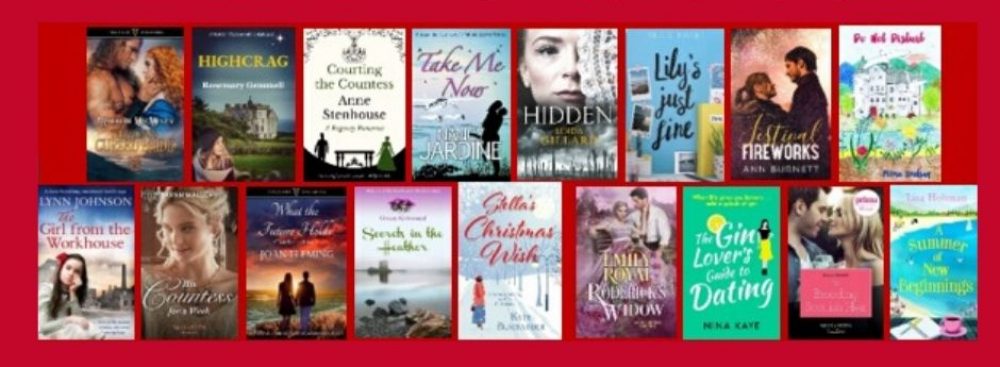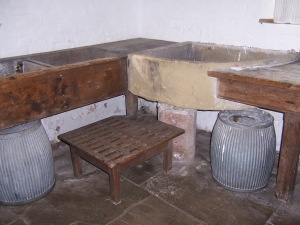This month Rhobin has asked us to say a little about what research we need to do to write our novels and what, if anything, annoys us about inaccuracies in fictional work.
Research is a necessity no matter how light and fluffy or serious and thought-provoking your work. As soon as you make any statement that can be viewed in another light, you need to know what you based your statement on.
I write in the early nineteenth century when the main mode of transport was one’s own feet, but for the slightly better off, the horse. I need to know how many horses pulled a carriage, mail-coach and curricle. I need to know how long it took to get from London to Richmond or Edinburgh or Bath. I need to know…
You get the point.
A lot is written about the period I’ve chosen and it is easily accessible in on-line and print sources. But there are other ways to do research.
I love being a life member of Historic Scotland and of the National Trust for Scotland. I adore wandering around their properties and studying the portraits of the ‘family’ aligned along the walls of the Gallery. Was there really a nose that distinctive and, oh, why didn’t the Fifth Earl have it, then? The ladies are particularly interesting because they are brought in to marry the heirs and one wonders what life was like for them.
At the same time, our wealthy heroes and heroines didn’t exist in a vacuum and some of my most precious inspiration has come from the outbuildings and below stairs premises. The wip began life as a result of visiting these laundries.
What takes me out of a story? Disregard for the social mores of the time written about. Writing historical fiction is not about dressing flip young things in long frocks or tail coats. Historical fiction needs to imbue the way of life the characters lived. If a girl could not leave home without her maid or other chaperon, then she lived a very different existence to her 21st century counterpart. The biographies of those who dared to defy their ‘friends’, as relatives were sometimes known, can be heart-breaking. Take the plot of Austen’s Sense and Sensibility, for example. Personal relationships needed great and enduring care. Rights were often clouded by law rather than protected.
I’m followed in this cycle by Helena Fairfax who can be found here: Helena Fairfax http://helenafairfax.com/ but the others blogging on research are all listed below. You may want to find out a little about how they tackle the issues involved in not getting egg on our faces.
Margaret Fieland http://www.margaretfieland.com/blog1/
Beverley Bateman http://beverleybateman.blogspot.ca/
Skye Taylor http://www.skye-writer.com/
Rachael Kosnski http://rachaelkosinski.weebly.com/
Heidi M. Thomas http://heidiwriter.wordpress.com/
Marci Baun http://www.marcibaun.com/
Anne Stenhouse https://annestenhousenovelist.wordpress.com/
Helena Fairfax http://helenafairfax.com/
Connie Vines http://connievines.blogspot.com/
Kay Sisk http://kaysisk.blogspot.com
Fiona McGier http://www.fionamcgier.com/
A.J. Maguire http://ajmaguire.wordpress.com/
Judith Copek http://lynx-sis.blogspot.com/
Lynn Crain http://www.awriterinvienna.blogspot.com
Rhobin Courtright http://www.rhobinleecourtright.com/



Hi Anne, I like your comment that the aristocracy didn’t live in a vacuum, and I like the way you have tried to throw yourself into the whole life of your historical characters. Trying to empathise in this way takes your research to a deeper level. Interesting post!
LikeLike
Thanks for dropping by, Helena. Yes, I once played the maid, Louka, in GBS’s Arms And The Man when we did it as a school production. I sometimes wonder whether that was a defining moment. She wore black with a white apron and not pale blue with flounces. But, she was such an interesting character. I left the princess cult behind then. Anne
LikeLike
I read many historical novels and enjoy time-traveling in this manner. Photo of laundry gives me the shivers and appreciation for my machine. Good post!
LikeLike
Hi Rhobin, Yep! I truly appreciate my machine, too. Anne
LikeLike
Very interesting post, Anne – love the old laundry. We had a Victorian one quite near us but don’t know if it’s still there (must check).
LikeLike
Hi Ros, Photographs are our friends when it comes to research, I think. The House of Dun in the north east, has a complete one with wooden stretchers that roll out on metal rails. Makes you realise the sheer volume of stuff that went through the process, Anne
LikeLike
It’s great that you take your research seriously and try to stay true to all aspects of your period. I approve!
LikeLike
Hullo Judy, thanks for dropping by. I do enjoy research. Anne
LikeLike
Another Scotland lover like myself. Whenever we go to Scotland, we purchase memberships for Historic Scotland and the National Trust of Scotland. They make seeing the country and places a lot more affordable.
I agree with your statement about people not existing in a vacuum though some really couldn’t think outside of their own class.
Thanks for sharing, nice post.
LikeLike
Hi Lynn, thanks for dropping by. I’m glad you enjoy your visits here. I enjoy travelling and have recently spent a month in India. Yes, a lot of folk have very rigid parameters. this gives the writer a lot of scope, I feel, to cause trouble for characters. Anne
LikeLike
I do appreciate an author delving into researching the times they are chronicling in their stories. Little tidbits of information like the food and how it is prepared, the way they warmed their houses, the garments they wore, and the manners of that time add so much to the story. Enjoyed your post.
LikeLike
Hullo JQ, thank you. It is one of the delights of historicals, I think, those moments when you realise what it was like. Anne
LikeLike
I envy those who write historical. I don’t want to write it, but I always think the research would be so much fun. And you made it sound very interesting.
Beverley
LikeLike
Hi Beverley, it is fun, but it can be frustrating, too. Sometimes you just wish they could pick up the phone… anne
LikeLike
It must be wonderful to have access to such places where you can research firsthand. When I visited Europe, I loved studying the portraits in the castles and manor houses. My fertile imagination always wondered what their lives were like. Did they like who they married? Were they happy? What were their every day lives like?
Maybe some day I will write that Regency novel brewing in the back of my head. Maybe not. Whether I do or not, I am sure I would have fun researching it. 😀
Great post, Anne.
LikeLike
Hi Marci, I think you’d have fun, too. The new wip is from a servant’s vp so I’m gearing up to look at a different history altogether. Anne
LikeLike
Nice post, Anne. It’s so important to get it as right as you possibly can, isn’t it? There is always someone who spots the mistake if you make one.
LikeLike
Hi Christine, Yes, sadly, there is. Thanks for dropping by, Christine. Anne
LikeLike
My late father grew up in Glasgow during the early 30’s. I asked his sister once, since she was 14 years older than him, what it was like living in “the slums” as my dad used to call the tenements he remembered. Many families on a floor, one shared bathroom–little more than a sink and a toilet. The apartments had only one room, so the kids and their parents all slept in close proximity. No real privacy for anyone was possible. Auntie Cathy told me that laundry day involved getting water from the “midden” out back, since they needed a lot of it. They’d heat it in huge kettles, then throw all of the whites into the big tub filled with the boiling water, and wash them, stirring with a paddle, then rinsing them laboriously, wringing them out, then hanging them out back. Then they’d wash the colors. Last, when the water was cooling, they’d wash the darker colors. Then once the laundry was done, their Dad would get his bath in the same water. Then each of the family members took their turn. That’s why my Dad used to laugh that he took a weekly bath, “Whether he needed it or not”, just because he could. So different from our American obsession with daily showers and ointments all over us, lest we smell human and offend someone. A Madison Avenue advertising success story, to be sure!
And that wasn’t even a hundred years ago. It really was a different world, back in earlier times. If I ever get wealthy enough to travel, I’d like to walk the streets of Glasgow, to honor my Dad. And I’d bring some of his ashes with me, since he wanted part of him to be in his native land, and the other in his adopted land. Barring that, I’ll need to toss him in to the Gulf Stream somewhere, so he can ride the ocean currents from one place to the other.
LikeLike
Oh Fiona, This is all very familiar. I didn’t grow up in Glasgow, but I know many who did. My granny who brought up five children through the Depression of the 30s, kept a pig at the bottom of the garden. I remember visiting her farmworker husband’s house which had no running water, in the 1950s. As you say less than a hundred years. Anne
LikeLike